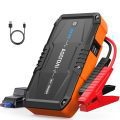This guide offers a comprehensive, step-by-step process for selecting the ideal multi-port USB charger tailored to your specific charging requirements. It emphasizes the importance of understanding your devices’ power needs, evaluating the charger’s output capacity, considering the number of ports, and assessing safety features. By following these steps, you can ensure that you choose a charger that enhances your device’s performance while providing convenience and efficiency in your daily charging routine.



Identify Your Devices
List all the devices you plan to charge using the multi-port USB charger. Include smartphones, tablets, laptops, and any other USB-powered devices, such as e-readers, smartwatches, or portable gaming consoles. Write down the name and model of each device to help you keep track of their charging needs.
Check the power requirements for each device. Look for the wattage or amperage specifications usually listed on the device’s power adapter or in the user manual. Note the total charging capacity you will need from the multi-port USB charger to ensure it can handle all your devices simultaneously without overloading.


Check Power Requirements
Examine the power specifications for each device on your list. Look for the voltage (V) and current (A) requirements printed on the device or in the user manual. For example, a smartphone may require 5V and 2A for optimal charging, while a laptop might need 20V and 3A. Make a note of these values for each device.
Compare these requirements with the output specifications of your charger. Check if the charger can deliver the necessary voltage and current simultaneously for all your devices. For instance, if you have a charger that outputs 5V at 2A for each port, and you plan to charge two smartphones and a tablet that needs 5V and 3A, ensure that the charger can handle a total output of at least 7A. If it cannot, consider purchasing a more powerful charger or charging devices in succession rather than simultaneously.
Determine Port Count
Assess how many devices you typically charge at the same time. Consider all your devices, including smartphones, tablets, smartwatches, and any other USB-powered gadgets you may use regularly. Count the number of devices in your household or workspace that require charging simultaneously. Factor in any occasional guests or family members who might also need charging capabilities. This will give you a baseline number to work with.
Select a multi-port USB charger that matches or exceeds your calculated device count. If you usually charge three devices but anticipate getting more in the future, opt for a charger with at least four or five ports. This foresight ensures you won’t run out of charging options as you add new devices. Look for chargers that provide fast charging options and maintain compatibility with various device types to maximize efficiency.
Consider Fast Charging Features
Assess your daily routines and charging habits to determine whether fast charging capabilities are essential for your devices. Consider how often you find yourself in need of a quick battery boost, especially during busy days or when traveling. If you frequently rely on your devices for work, communication, or entertainment, investing in fast charging could significantly enhance your productivity.
Research chargers that support Quick Charge or Power Delivery technologies, as these standards enable faster charging speeds compared to conventional chargers. Compare specifications and compatibility with your devices to ensure optimal performance. Look for chargers that list their wattage output clearly and check for reviews that mention charging times. Prioritize purchasing products from reputable brands to guarantee safety and reliability during the charging process.
Look for Safety Features
Consider the safety features of chargers when charging multiple devices. Look for chargers that offer built-in protections like over-current, over-voltage, and short-circuit prevention. These features help safeguard your devices from damage caused by electrical surges or faults. Check the product specifications to ensure these safety features are explicitly mentioned.
Choose a charger from reputable brands known for quality and reliability. Read customer reviews and ratings to see how well the charger performs in real-life situations. Pay attention to any complaints regarding safety issues, as this will provide insight into the charger’s reliability. Inspect the charger for certifications, such as UL or CE marks, which indicate compliance with safety standards. Always prioritize safety to protect your devices and maintain peace of mind while charging.
Read Reviews and Ratings
Research online reviews and ratings for the chargers you are considering. Focus on user experiences related to:
- Performance: Identify how well the charger functions under various conditions. Look for comments on charging speed and compatibility with different devices.
- Durability: Check for insights on the charger’s lifespan. See if users mention wear and tear, and any issues with overheating or fraying cables.
- Issues: Note any recurring problems reported by users. Pay attention to specific complaints, such as failure to charge or poor customer service.
Gather information from multiple sources, including reputable tech websites and consumer review platforms. Balance opinions by considering both positive and negative feedback. Prioritize chargers with a higher number of reviews and consistent ratings for a more reliable assessment.
Compare Prices and Brands
Research various brands and retailers to find the best prices for the products you need. Visit online shopping platforms, local stores, and brand websites to gather pricing information. Create a list of reputable brands that are known for their quality and reliability, ensuring you consider customer reviews and ratings as part of your assessment.
Evaluate budget-friendly options that still meet your requirements. Compare the features, warranty, and customer service offered by different brands, as these factors can greatly influence your overall satisfaction. Take note of any promotions, discounts, or seasonal sales that may be available, as these can further enhance your savings.
Final Tips for Selection
In conclusion, selecting the ideal multi-port USB charger requires a careful assessment of your devices and their power needs, along with an understanding of safety features and charging speeds. By applying the criteria outlined in this guide, you can confidently choose a charger that not only meets your requirements but also enhances the charging experience for all your devices. Investing time in this decision will lead to more efficient and safe charging, ultimately simplifying your tech life.
Essential Gear Checklist
- Multi-port USB charger options
- Device power requirement specifications
- Power rating labels from devices
- User manuals for devices
- Fast charging technology information
- Safety certification information
- Product review sources
- Price comparison tools



Maximize Charging Efficiency
- Determine Your Power Needs: Assess the wattage requirements of your devices to ensure the charger can provide adequate power for all of them simultaneously
- Check the Number of Ports: Choose a charger with enough ports to accommodate all your devices, considering future needs as well
- Look for Fast Charging Technology: Opt for chargers that support fast charging standards like Quick Charge or Power Delivery to save time when charging
- Evaluate Port Type Compatibility: Ensure the charger has the right type of ports (USB-A, USB-C) to match your devices and accessories
- Consider Build Quality: Select chargers from reputable brands known for quality and safety features to minimize the risk of overheating or short circuits
- Check for Smart Charging Features: Look for chargers with smart charging technology that can automatically adjust the output based on the device’s requirements
- Read Customer Reviews: Research user experiences to assess reliability, performance, and any potential issues with the charger
- Assess Port Output Ratings: Review the amp ratings for each port to ensure that they can deliver sufficient power for each device
- Look for Safety Certifications: Ensure the charger has safety certifications (like UL, CE, FCC) to ensure it meets safety standards
- Consider Size and Portability: For travel purposes, choose a compact charger that is easy to carry without compromising on functionality






I have a ton of devices, and I tweaked the steps a bit. Instead of just checking power requirements, I also considered the charging speed of my devices. I ended up getting a charger that supports Power Delivery, which is super helpful for my MacBook Pro!
If you’re into fast charging, check out the Aukey Omnia 100W Charger! It’s compact and can charge multiple devices in no time. Would love to hear if anyone else has tried it!
Love this guide! I got the HyperJuice 100W Charger and it’s been a lifesaver for traveling. I can charge my phone, laptop, and even my smartwatch at the same time. Highly recommend it!
Thanks for sharing your experience! The HyperJuice is a fantastic choice for travelers. Its compact design and high power output make it a versatile option for on-the-go charging.
I ran into some issues figuring out the right wattage for my devices. I have a laptop that requires more power, but I kept getting lower wattage chargers. Any tips on how to find the right charger for higher wattage devices?
Great question! For higher wattage devices like laptops, always look for chargers that specifically mention compatibility with your device’s wattage. Brands like RAVPower and Aukey usually have detailed specs. Also, check the USB-C Power Delivery ratings if your device supports it.
It would be awesome if you could do a piece on the best cables to use with multi-port chargers! Sometimes the quality of the cable can make a huge difference in charging speed.
Could you possibly cover the environmental impact of multi-port USB chargers in a future article? It would be cool to know if certain brands are more eco-friendly!
Seriously, read those reviews! I almost bought a cheap charger, but the reviews pointed out it overheats. Ended up going with the Belkin BoostCharge, and it’s been solid so far!
Absolutely! Reviews can save you from making costly mistakes. The Belkin BoostCharge is a solid choice, and it’s always good to see what real users say about performance and safety.
I’m curious if anyone has experience with chargers that have both USB-A and USB-C ports. Are they as efficient? I want to make sure I’m not sacrificing speed.
Great point! USB-C ports tend to provide faster charging compared to USB-A. Many modern multi-port chargers, like the Satechi USB-C Pro Hub, offer both types and manage power distribution well, so you can charge multiple devices efficiently.
I followed this guide and ended up getting the Anker PowerPort 4! It’s been a game-changer for my household. I can charge my phone, tablet, and even my wireless headphones all at once without any issues. Highly recommend checking the power requirements before buying, though!